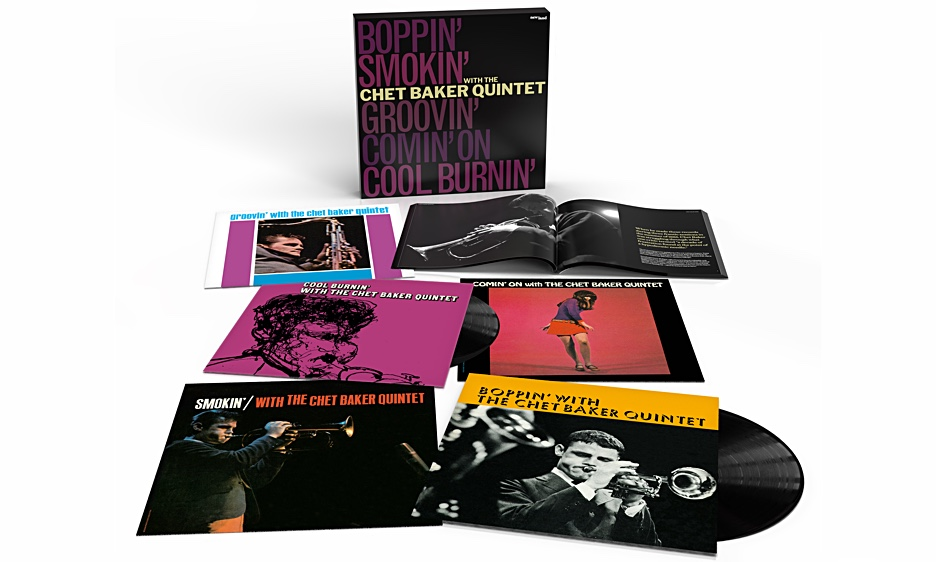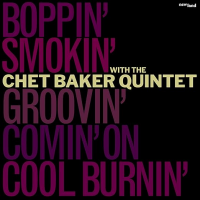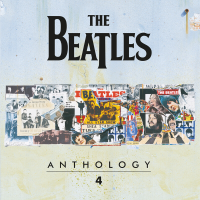Home » Jazz Articles » Highly Opinionated » Chet Baker's Five from '65 - New Land's Best Box Set Yet
Chet Baker's Five from '65 - New Land's Best Box Set Yet

 Five From '65: The Quintet Summer Sessions
Five From '65: The Quintet Summer SessionsChet Baker
New Land Records
2025
We are far enough into the vinyl revival that box sets are now becoming commonplace, and the New Land label has been particularly adventurous—almost quixotic—in its offerings. New Land devoted its first jazz box to six studio albums by harpist Dorothy Ashby and its second to four discs worth of live airshots by bassist Charles Mingus. A renewed interest in spiritual jazz made the Ashby set a plausible venture, but the harpist's relative obscurity and the uneven quality of the albums themselves cannot have helped its sales. The Mingus set offered exactly the kind of material best suited to digital—live recordings of moderate fidelity with numerous duplicated tracks by a thoroughly documented artist. How many listeners want to pay premium vinyl prices for four takes of "Eat That Chicken?" It's a brave question to ask, and kudos to New Land for asking it.
Comes now the label's most practical set yet, one devoted to an artist whose discography runs to truly biblical proportions: Chet Baker. Of course, there wouldn't be so much Baker product flooding the marketplace if Chet didn't have above-average name recognition and above-average talent, think what you will about the myths and legends surrounding his career. The set, Five from '65, reissues—you guessed it—five albums Baker cut for Prestige soon after returning to the States from five years of exile in Europe: Cool Burnin', Smokin', Comin' On, Boppin' and Groovin'.
For their third outing, New Land wisely chose an artist with good name recognition and a sequence of very likable albums that haven't been too overexposed to collectors. New Land trumpets that these albums have not been issued on vinyl for 50 years, but it's worth noting that the sessions comprising them were re-released in the mid-nineties on a sequence of three compact discs: Stairway to the Stars, Lonely Star, and On a Misty Night. Yes, this writer bought the CDs when they came out, yes, that does make him feel very old, and no, he cannot imagine why two of the three discs had the word "Star" in the title. Maybe Prestige was worried buyers wouldn't be confused enough?
Now, thirty years after those digital versions hit the marketplace, New Land offers Baker's five LPs in original running order cut from all analog sources, in ever so trendy mono sound. Long time jazz fans will note the very intentional evocation by these titles of Miles Davis's much loved sequence of albums for the same label cut roughly in the mid-fifties: Workin', Steamin', Relaxin', and Cookin'. Those four albums taught the brass at Prestige that long sessions by top line musicians playing virtually "live" in the studio could result in very saleable product. Also, that g-dropping, er, g-droppin,' is always hip.
Of course, Davis recorded his g-drop albums at the beginning of a long career ascent, right before he decamped to Columbia, under whose auspices he eventually released seventy-something more LPs. Chet, in contrast, devoted his five years abroad to cutting sessions of varying quality, scoring dope, and serving jail time. The poll-winning star of the early fifties was considered a has-been by many when he returned to the States in the mid-sixties.
The Prestige sessions were not Baker's first upon landing on native soil. Before working with Prestige he managed to squeeze in The Most Important Jazz Album of 1964-1965 on Colpix (what a terrible title! Choose a year, people!), Baby Breeze on Limelight (wasn't Chet well past the baby stage?), and Baker's Holiday (at least a pun) on Limelight as well. These releases all have their charms, but they hedge their bets by featuring Baker's divisive vocals on several tracks. In contrast, the Prestige g-drops represent the most focused early work of Baker's attempted comeback.
To begin with, Prestige put Baker in company with truly top line musicians: George Coleman on tenor saxophone, Roy Brooks on drums, Kirk Lightsey making his debut on piano, and the least known of the bunch, Herman Wright on bass. Wright is more than acceptable and acquits himself well on his solo spots. Lightsey sounds young and hungry. He's a relatively interventionist accompanist without becoming overbearing, and fleet of finger in his solo spots. Coleman has gotten a bad rap for his role as "not Wayne Shorter" in Miles Davis' second great quintet right before Mr. Weird arrived and sent the group into orbit. But Coleman's an excellent player—just listen to his extended features on the recent Miles in France box set if you have any doubts—and in the less intimidating company of Chet, George comes off as masterly and relaxed. Brooks has gained some recent reissue love, with his live date Understanding dropping in 2021, and his career-best The Free Slave getting a deluxe vinyl reissue more recently. His work on the Prestige dates is more restrained than his seventies playing, but he is consistently tasteful and driving here.
Chet distinguishes himself by sticking exclusively to flugelhorn—and not singing a note. Baker sounds very good indeed on the big horn and his soloing demonstrates his characteristic melodic imagination and grace. There are a couple fluffed notes, but that's to be expected given the circumstances of the recording, and Baker never was a perfectionist. The overall impression is of a very accomplished improviser who rarely hints at his emotions and show no interest in pyrotechnic displays or scale running.
The sessions seem to have been intended to establish Baker's "hard jazz" credentials—they are all business, with a mix of a few standards, several tunes by Tadd Dameron, who died a few months before the recording sessions, and a number of ready-made but perfectly adequate blowing vehicles by Jimmy Mundy—many unfortunately credited to Baker's manager at the time, Richard Carpenter. These tunes are effective enough, if somewhat slight in their references to better known tunes and reliance on formulaic melodic structures. As the liner notes point out, the releases were given a mixed reception upon release.
Chet's g-drop albums certainly weren't cutting edge for 1965. A Love Supreme had released a few months before, and Miles' second great quintet unleashed ESP upon the world soon after Baker laid down these sessions. Six decades later, it is easier to recognize that, cutting edge or not, Baker created five albums of well-above-average jazz with a quintet boasting demonstrably good chemistry, excellent chops, and a relaxed vibe. A contemporary listener can sink happily into his or her listening chair as the performances roll by without regretting that Baker never embraced modal jazz or the avant-garde.
The albums are much of a muchness in musical quality, but if you want an album to start with, Boppin' features two of Tadd Dameron's strongest compositions and has a slight edge for energy. Comin' On is weakest by a hair, with "No Fair Lady" one of the more forgettable ready-mades and the final tune of the album, "Carpsie's Groove," uncharacteristically tired. The other three land somewhere between, and pulling any one of the albums out of the box at random is almost certain to produce pleasure in any listener willing to drop the requested dosh on a set by Baker in the first place. The definition of a good box is one whose every album is appealing to play, and Five from '65 fits that bill.
The LP's are quiet and well-centered, with very good fidelity—as they should be at the asking price. The stereo version on the CD (and on a stray copy of Cool Burnin' picked up in the wilds of Iowa), segregates the horns in left and right speakers, with the rhythm section more or less centered. The mono vinyl, needless to say, keeps the band closer together. One can detect a little more detail on cymbals and a little bit more prominent bass on the vinyl, but compared with the New Land issues, the mid-nineties digital mastering acquits itself just fine, so don't buy this set in hopes of a huge sonic upgrade if you already have the silver discs. That said, this music sounds best (by a narrow margin) on vinyl and is best consumed in twenty-minute chunks, given that all five albums'-worth of tracks were recorded with the same personnel at just three sessions within a few days. Going through sixty-five minutes at a stretch on CD, one is likely to lose focus.
The artwork on each LP is reproduced with acceptable quality, though my OG edition of Groovin' has slightly more vivid colors. Unfortunately, these covers are even more of an aesthetic jumble than those from Miles' g-drop series. Don't show Cool Burnin's cover to small children. And why is there a hip sixties chick on the front of Comin' On's? Surely they hadn't run out of pictures of the ever-photogenic Chet? An old saw states the difference between an album by Blue Note as versus Prestige was two hours of rehearsal, but let's add in twenty-minutes of art direction, too. It is interesting to speculate how much of the better known, more collected label's reputation stems from its featuring cover art that doesn't suck.
The box the LPs arrive in is perfectly square, reasonably sturdy, and not so tight you cannot lift the LPs out of it, which is about the best one can say for a box-set-box unless you really fetishize the things, in which case, no judgment here. The design won't win any awards, but it doesn't hurt the eyes, unlike the nightmare fuel of Cool Burnin'.
Finally, as is so often the case with these productions, a glossy, LP-sized booklet is enclosed. There are pictures: of Baker, of his confrères, of tape boxes (never quite understood the appeal of that, but whatever) and there is a substantial essay by James Gavin. Unfortunately, Mr. Gavin is so fixated on the sociopathic behavior of Baker's manager, Richard Carpenter, that Carpenter gets more column inches than the trumpeter himself. Carpenter indeed sounds like a piece of work, but given that he and Chet are both long dead, it would have been more productive to focus on the musical treasures Baker created in 1965 than Carpenter's nefarious behavior. If there is a Grammy award for most depressing liner notes, Gavin has it in the bag.
In interviews from the time, Baker notes that he was a much stronger player in 1965 than when he was winning polls as in the early fifties, and his playing on these sides bears that claim out. Still, it is hard to argue that the music here has the freshness and fascination of Baker's best sides with Gerry Mulligan, or his excellent collaborations with pianist Russ Freeman (the Russ Freeman and Chet Baker album on Pacific includes eight of the best tracks the trumpeter ever cut). But the Prestige sessions from 1965 are still very good stuff indeed, and ideal for consumption in LP form. The box has already disappeared from some online retailers, but if you like Baker at all and collect the black stuff, it comes highly recommended.
Tags
Highly Opinionated
Chet Baker
Patrick Burnette
Dorothy Ashby
Charles Mingus
Mile Davis
George Coleman
Roy Brooks
Kirk Lightsey
Wayne Shorter
Tadd Dameron
Gerry Mulligan
Chet Baker's Five from '65
Five From '65: The Quintet Summer Sessions
New Land Records
PREVIOUS / NEXT
Support All About Jazz
 All About Jazz has been a pillar of jazz since 1995, championing it as an art form and, more importantly, supporting the musicians who make it. Our enduring commitment has made "AAJ" one of the most culturally important websites of its kind, read by hundreds of thousands of fans, musicians and industry figures every month.
All About Jazz has been a pillar of jazz since 1995, championing it as an art form and, more importantly, supporting the musicians who make it. Our enduring commitment has made "AAJ" one of the most culturally important websites of its kind, read by hundreds of thousands of fans, musicians and industry figures every month.



























